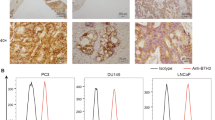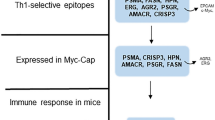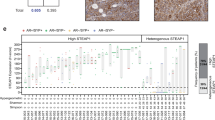Abstract
Prostate cancer is the second most commonly diagnosed cancer in men. Recent evidence suggests that reduced expression of target protein antigens and human leukocyte antigen (HLA) molecules is the predominant immune escape mechanism of malignant prostate tumor cells. The purpose of this study was to investigate the prospect of antigen specific immunotherapy against prostate cancer via the HLA class II pathway of immune recognition. Here, we show for the first time that prostate cancer cells express HLA class II proteins that are recognized by CD4+ T cells. Prostate tumor cells transduced with class II molecules efficiently presented tumor-associated antigens/peptides to CD4+ T cells. This data suggests that malignant prostate tumors can be targeted via the HLA class II pathway, and that class II-positive tumors could be employed for direct antigen presentation, and CD4+ T-cell mediated tumor immunotherapy.
This is a preview of subscription content, access via your institution
Access options
Subscribe to this journal
Receive 4 print issues and online access
$259.00 per year
only $64.75 per issue
Buy this article
- Purchase on Springer Link
- Instant access to full article PDF
Prices may be subject to local taxes which are calculated during checkout





Similar content being viewed by others
References
Brand TC, Tolcher AW . Management of high risk metastatic prostate cancer: the case for novel therapies. J Urol 2006; 176: S76–S80.
Heath EI, Carducci MA . New targets in the management of prostate cancer. Hematol Oncol Clin North Am 2006; 20: 985–999.
Swanson G, Thompson I, Basler J, Crawford ED . Metastatic prostate cancer-does treatment of the primary tumor matter? J Urol 2006; 176: 1292–1298.
Stewart AB, Lwaleed BA, Douglas DA, Birch BR . Current drug therapy for prostate cancer: an overview. Curr Med Chem Anticancer Agents 2005; 5: 603–612.
Cross D, Burmester JK . Gene therapy for cancer treatment: past, present and future. Clin Med Res 2006; 4: 218–227.
Desai P, Jimenez JA, Kao C, Gardner TA . Future innovations in treating advanced prostate cancer. Urol Clin North Am 2006; 33: 247–272.
Arlen PM, Gulley JL . Therapeutic vaccines for prostate cancer: a review of clinical data. Curr Opin Investig Drugs 2005; 6: 592–596.
Webster WS, Small EJ, Rini BI, Kwon ED . Prostate cancer immunology: biology, therapeutics, and challenges. J Clin Oncol 2005; 23: 8262–8269.
Elsasser-Beile U, Wolf P, Gierschner D, Buhler P, Schultze-Seemann W, Wetterauer U . A new generation of monoclonal and recombinant antibodies against cell-adherent prostate specific membrane antigen for diagnostic and therapeutic targeting of prostate cancer. Prostate 2006; 66: 1359–1370.
Fong L, Small EJ . Immunotherapy for prostate cancer. Curr Urol Rep 2006; 7: 239–246.
Hillman GG, Kallinteris NL, Lu X, Wang Y, Wright JL, Li Y et al. Turning tumor cells in situ into T-helper cell-stimulating, MHC class II tumor epitope-presenters: immuno-curing and immuno-consolidation. Cancer Treat Rev 2004; 30: 281–290.
Holling TM, Schooten E, van Den Elsen PJ . Function and regulation of MHC class II molecules in T-lymphocytes: of mice and men. Hum Immunol 2004; 65: 282–290.
Gerloni M, Zanetti M . CD4T cells in tumor immunity. Springer Semin Immunopathol 2005; 27: 37–48.
Marsman M, Jordens I, Griekspoor A, Neefjes J . Chaperoning antigen presentation by MHC class II molecules and their role in oncogenesis. Adv Cancer Res 2005; 93: 129–158.
Haque A, Blum JS . New insights in antigen processing and epitope selection: development of novel immunotherapeutic strategies for cancer, autoimmunity and infectious diseases. J Biol Regul Homeost Agents 2005; 19: 93–104.
Wu JD, Higgins LM, Steinle A, Cosman D, Haugk K, Plymate SR . Prevalent expression of the immunostimulatory MHC class I chain-related molecule is counteracted by shedding in prostate cancer. J Clin Invest 2004; 114: 560–568.
Machlenkin A, Paz A, Bar Haim E, Goldberger O, Finkel E, Tirosh B et al. Human CTL epitopes prostatic acid phosphatase-3 and six-transmembrane epithelial antigen of prostate-3 as candidates for prostate cancer immunotherapy. Cancer Res 2005; 65: 6435–6442.
Pavlenko M, Leder C, Roos AK, Levitsky V, Pisa P . Identification of an immuno-dominant H-2D(b)-restricted CTL epitope of human PSA. Prostate 2005; 64: 50–59.
McNeel DG, Nguyen LD, Disis ML . Identification of T helper epitopes from prostatic acid phosphatase. Cancer Res 2001; 61: 5161–5167.
Schroers R, Shen L, Rollins L, Xiao Z, Sonderstrup G, Slawin K et al. Identification of MHC Class II-restricted T-cell epitopes in prostate-specific membrane antigen. Clin Cancer Res 2003; 9: 3260–3271.
Klyushnenkova EN, Link J, Oberle WT, Kodak J, Rich C, Vandenbark AA et al. Identification of HLA-DRB1*1501-restricted T-cell epitopes from prostate-specific antigen. Clin Cancer Res 2005; 11: 2853–2861.
Qin H, Zhou C, Wang D, Ma W, Liang X, Lin C et al. Specific antitumor immune response induced by a novel DNA vaccine composed of multiple CTL and T helper cell epitopes of prostate cancer associated antigens. Immunol Lett 2005; 99: 85–93.
Jones EY, Fugger L, Strominger JL, Siebold C . MHC class II proteins and disease: a structural perspective. Nat Rev Immunol 2006; 6: 271–282.
Stern LJ, Potolicchio I, Santambrogio L . MHC class II compartment subtypes: structure and function. Curr Opin Immunol 2006; 18: 64–69.
Weber DA, Dao CT, Jun J, Wigal JL, Jensen PE . Transmembrane domain-mediated colocalization of HLA-DM and HLA-DR is required for optimal HLA-DM catalytic activity. J Immunol 2001; 167: 5167–5174.
Sant AJ, Chaves FA, Jenks SA, Richards KA, Menges P, Weaver JM et al. The relationship between immunodominance, DM editing, and the kinetic stability of MHC class II:peptide complexes. Immunol Rev 2005; 207: 261–278.
Villadangos JA, Bryant RA, Deussing J, Driessen C, Lennon-Dumenil AM, Riese RJ et al. Proteases involved in MHC class II antigen presentation. Immunol Rev 1999; 172: 109–120.
Riese RJ, Chapman HA . Cathepsins and compartmentalization in antigen presentation. Curr Opin Immunol 2000; 12: 107–113.
Haque MA, Hawes JW, Blum JS . Cysteinylation of MHC class II ligands: peptide endocytosis and reduction within APC influences T cell recognition. J Immunol 2001; 166: 4543–4551.
Lich JD, Elliott JF, Blum JS . Cytoplasmic processing is a prerequisite for presentation of an endogenous antigen by major histocompatibility complex class II proteins. J Exp Med 2000; 191: 1513–1524.
Pathak SS, Blum JS . Endocytic recycling is required for the presentation of an exogenous peptide via MHC class II molecules. Traffic 2000; 1: 561–569.
Li P, Haque MA, Blum JS . Role of disulfide bonds in regulating antigen processing and epitope selection. J Immunol 2002; 169: 2444–2450.
Haque MA, Ping L, Jackson SK, Zarour HM, Hawes JW, Phan UT et al. Absence of gamma-interferon-inducible lysosomal thiol reductase in melanomas disrupts T cell recognition of select immunodominant epitopes. J Exp Med 2002; 195: 1267–1277.
Hiraiwa A, Yamanaka K, Kwok WW, Mickelson EM, Masewicz S, Hansen JA et al. Structural requirements for recognition of the HLA-Dw14 class II epitope: a key HLA determinant associated with rheumatoid arthritis. Proc Natl Acad Sci USA 1990; 87: 8051.
Haque A, Das A, Hajiaghamohseni LM, Younger A, Banik NL, Ray SK . Induction of apoptosis and immune response by all-trans retinoic acid plus interferon-gamma in human glioblastoma T98G and U87MG cells. Cancer Immunol Immunother 2007; 56: 615–625.
Wintterle S, Schreiner B, Mitsdoerffer M, Schneider D, Chen L, Meyermann R et al. Expression of the B7-related molecule B7-H1 by glioma cells: a potential mechanism of immune paralysis. Cancer Res 2003; 63: 7462–7467.
Kobayashi H, Nagato T, Oikawa K, Sato K, Kimura S, Aoki N et al. Recognition of prostate and breast tumor cells by helper T lymphocytes specific for a prostate and breast tumor-associated antigen, TARP. Clin Cancer Res 2005; 11: 3869–3878.
Martinez O, Brackenridge S, El-Idrissi M-A, Prabhakar BS . DC-SIGN, but not sDC-SIGN, can modulate IL-2 production from PMA- and anti-CD3-stimulated primary human CD4T cells. Int Immunol 2005; 17: 769–778.
Ayyoub M, Hesdorffer CS, Montes M, Merlo A, Speiser D, Rimoldi D et al. An immunodominant SSX-2-derived epitope recognized by CD4+ T cells in association with HLA-DR. J Clin Invest 2004; 113: 1225–1233.
Muczynski KA, Anderson SK, Pious D . Discoordinate surface expression of IFN-gamma-induced HLA class II proteins in nonprofessional antigen-presenting cells with absence of DM and class II colocalization. J Immunol 1998; 160: 3207–3216.
Rovere P, Zimmermann VS, Forquet F, Demandolx D, Trucy J, Ricciardi-Castagnoli P et al. Dendritic cell maturation and antigen presentation in the absence of invariant chain. Proc Natl Acad Sci USA 1998; 95: 1067–1072.
Knutson KL, Disis ML . Tumor antigen-specific T helper cells in cancer immunity and immunotherapy. Cancer Immunol Immunother 2005; 54: 721–728.
Kobayashi H, Nagato T, Aoki N, Sato K, Kimura S, Tateno M et al. Defining MHC class II T helper epitopes for WT1 tumor antigen. Cancer Immunol Immunother 2006; 55: 850–860.
Lepage S, Lapointe R . Melanosomal targeting sequences from gp100 are essential for MHC class II-restricted endogenous epitope presentation and mobilization to endosomal compartments. Cancer Res 2006; 66: 2423–2432.
Raffaghello L, Prigione I, Airoldi I, Camoriano M, Morandi F, Bocca P et al. Mechanisms of immune evasion of human neuroblastoma. Cancer Lett 2005; 228: 155–161.
Chamuleau ME, Ossenkoppele GJ, van de Loosdrecht AA . MHC class II molecules in tumour immunology: prognostic marker and target for immune modulation. Immunobiology 2006; 211: 619–625.
Clements VK, Baskar S, Armstrong TD, Ostrand-Rosenberg S . Invariant chain alters the malignant phenotype of MHC class II+ tumor cells. J Immunol 1992; 149: 2391–2396.
Oldford SA, Robb JD, Codner D, Gadag V, Watson PH, Drover S . Tumor cell expression of HLA-DM associates with a Th1 profile and predicts improved survival in breast carcinoma patients. Int Immunol 2006; 18: 1591–1602.
Xu M, Lu X, Kallinteris NL, Wang Y, Wu S, von Hofe E et al. Immunotherapy of cancer by antisense inhibition of Ii protein, an immunoregulator of antigen selection by MHC class II molecules. Curr Opin Mol Ther 2004; 6: 160–165.
Humphreys RE, Hillman GG, von Hofe E, Xu M . Forcing tumor cells to present their own tumor antigens to the immune system: a necessary design for an efficient tumor immunotherapy. Cell Mol Immunol 2004; 2: 180–185.
Thompson JA, Dissanayake SK, Ksander BR, Knutson KL, Disis ML, Ostrand-Rosenberg S . Tumor cells transduced with the MHC class II transactivator and CD80 activate tumor-specific CD4+ T cells whether or not they are silenced for invariant chain. Cancer Res 2006; 66: 1147–1154.
Acknowledgements
This work was supported by grants from the Leukemia and Lymphoma Society (3024), American Lung Association (RG-10435-N) and Hollings Cancer Center Seed Grant (GC-3319-05-4498CM) to AH and NC1 PO1 CA97132 to JSN. We are grateful to Dr Janice Blum (Indiana University, Indianapolis) for providing us with cell lines, antibodies and reagents. We also acknowledge Dr Christina Johnson (Medical University of South Carolina) for generously providing CWR22Rv1 cells, Drs D Holman, AM El-Zawahry, S ElOjeimy and X Liu for technical assistance and scientific discussions. We also thank Dr Natalie Sutkowski for her comments regarding the manuscript.
Author information
Authors and Affiliations
Corresponding author
Rights and permissions
About this article
Cite this article
Younger, A., Amria, S., Jeffrey, W. et al. HLA class II antigen presentation by prostate cancer cells. Prostate Cancer Prostatic Dis 11, 334–341 (2008). https://doi.org/10.1038/sj.pcan.4501021
Received:
Accepted:
Published:
Issue Date:
DOI: https://doi.org/10.1038/sj.pcan.4501021
Keywords
This article is cited by
-
Decreased human leukocyte antigen A*02:01 frequency is associated with risk of glioma and existence of human cytomegalovirus: a case–control study in Northern China
Cancer Immunology, Immunotherapy (2017)
-
A possible cross-talk between autophagy and apoptosis in generating an immune response in melanoma
Apoptosis (2012)
-
Oncolytic Virus-initiated Protective Immunity Against Prostate Cancer
Molecular Therapy (2011)



